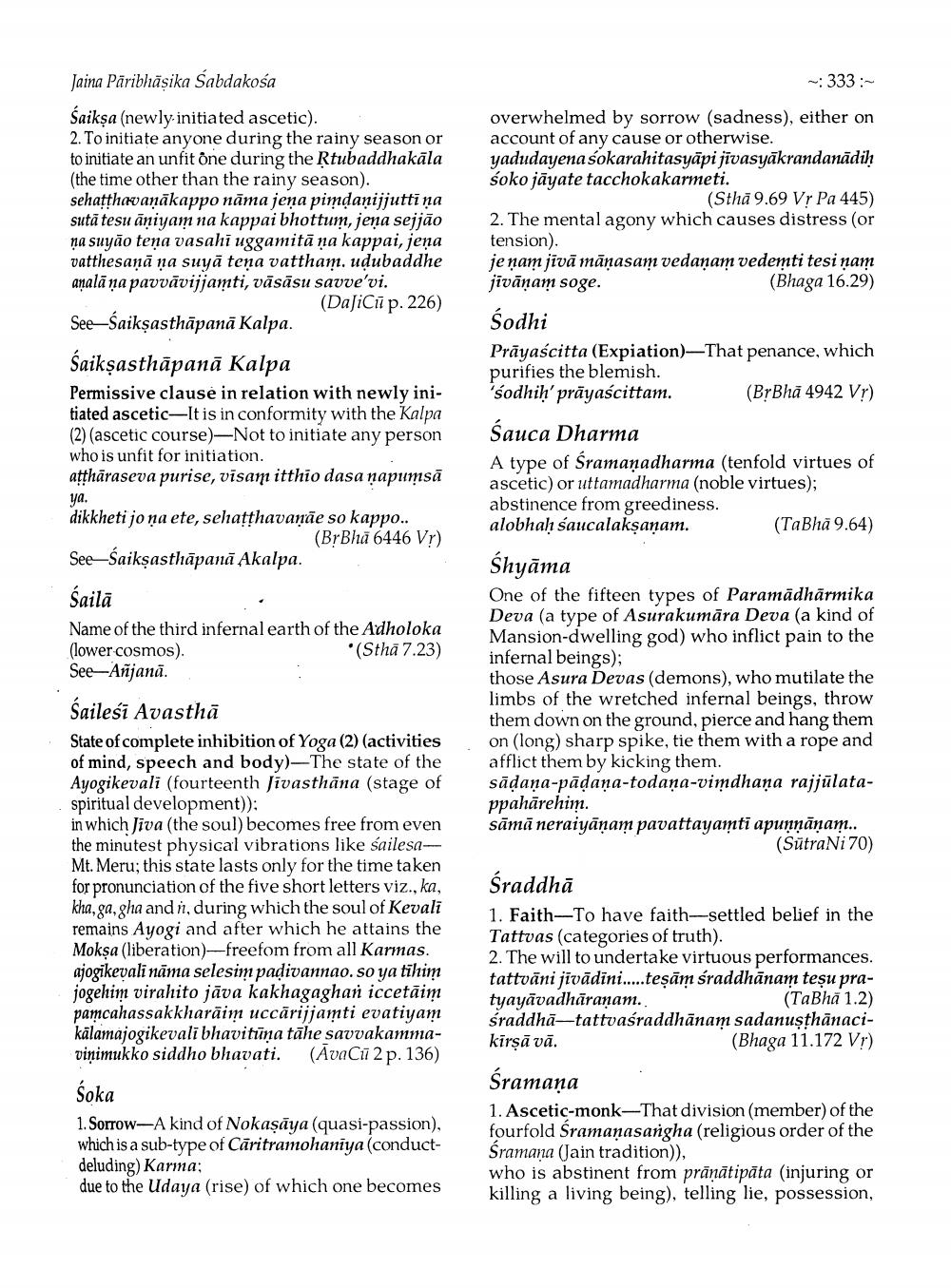________________
Jaina Pāribhāsika Sabdakosa Śaikṣa (newly.initiated ascetic). 2. To initiate anyone during the rainy season or to initiate an unfit one during the Rtubaddhakāla (the time other than the rainy season). sehatthavaņākappo nāma jena pimdanijjutti ņa sutā tesu āniyam na kappai bhottum, jeņa sejjão na suyão teņa vasahi uggamitā na kappai, jena vatthesaņāņa suyā tena vattham. udubaddhe aņalāņa pavvāvijjamti, vāsāsu savve'vi.
(DaJiCūp. 226) See-Saikşasthāpanā Kalpa. saikşasthāpanā Kalpa Permissive clause in relation with newly initiated ascetic-It is in conformity with the Kalpa (2) (ascetic course)-Not to initiate any person who is unfit for initiation. atthāraseva purise, visam itthio dasa napumsā ya. dikkheti jo na ete, sehatthavaņāe so kappo..
(BrBhā 6446 Vr) See-Saikşasthāpanā Akalpa. śailā Name of the third infernal earth of the Adholoka (lower cosmos).
*(Stha 7.23) See-Añjanā.
-333 :overwhelmed by sorrow (sadness), either on account of any cause or otherwise. yadudayena sokarahitasyāpi jīvasyākrandanādih śoko jāyate tacchokakarmeti.
(Sthā 9.69 V? Pa 445) 2. The mental agony which causes distress (or tension) je nam jīvā māṇasam vedanam vedemti tesi ņam jīvānam soge.
(Bhaga 16.29) Sodhi Prāyascitta (Expiation)—That penance, which purifies the blemish. 'sodhih' prāyaścittam. (BrBhā 4942 Vr)
Sauca Dharma A type of Sramanadharma (tenfold virtues of ascetic) or uttamadharma (noble virtues); abstinence from greediness. alobhah saucalaksanam.
(Tabhā 9.64)
Śhyāma One of the fifteen types of Paramādhārmika Deva (a type of Asurakumāra Deva (a kind of Mansion-dwelling god) who inflict pain to the infernal beings); those Asura Devas (demons), who mutilate the limbs of the wretched infernal beings, throw them down on the ground, pierce and hang them on (long) sharp spike, tie them with a rope and afflict them by kicking them. sādaņa-pādana-todaņa-vimdhana rajjūlatappahārehim. sāmā neraiyānam pavattayamti apunņāņam..
(SūtraNi 70)
Sailesi Avasthā State of complete inhibition of Yoga (2) (activities of mind, speech and body)-The state of the Ayogikevali (fourteenth Jivasthāna (stage of spiritual development)); in which Jiva (the soul) becomes free from even the minutest physical vibrations like sailesaMt. Meru; this state lasts only for the time taken for pronunciation of the five short letters viz., ka, kha, ga, gha andň, during which the soul of Kevali remains Ayogi and after which he attains the Mokṣa (liberation)-freefom from all Karmas. ajogikevali nāma selesim padivannao. so ya tihim jogehim virahito jāva kakhagaghari iccetāim pamcahassakkharäim uccärijjamti evatiyam kalamajogikevali bhavitūna tāhe savvakammaviņimukko siddho bhavati. (AvaCū2 p. 136)
Sraddhā 1. Faith—To have faith-settled belief in the Tattvas (categories of truth). 2. The will to undertake virtuous performances. tattvāni jīvādini.....teşām sraddhānam teşu pratyayāvadhāranam.
(TaBhā 1.2) sraddha-tattvasraddhānam sadanusthānacikīrsā vā.
(Bhaga 11.172 Vr)
Soka 1. Sorrow--A kind of Nokaṣāya (quasi-passion), which is a sub-type of Caritramohaniya (conductdeluding) Karma; due to the Udaya (rise) of which one becomes
Śramana 1. Ascetic-monk-That division (member) of the fourfold Sramanasangha (religious order of the Sramana (Jain tradition)), who is abstinent from prāṇātipāta injuring or killing a living being), telling lie, possession,




